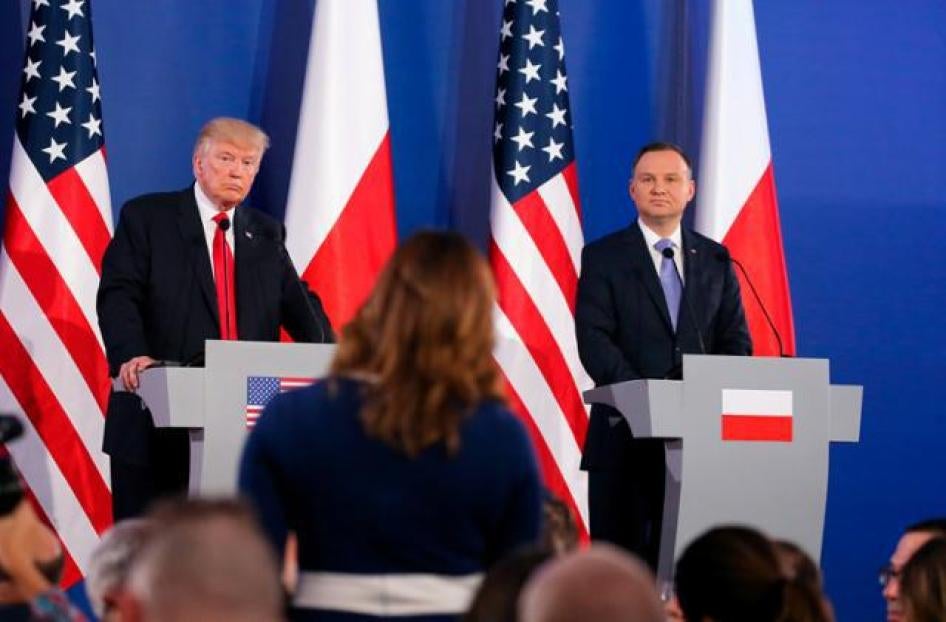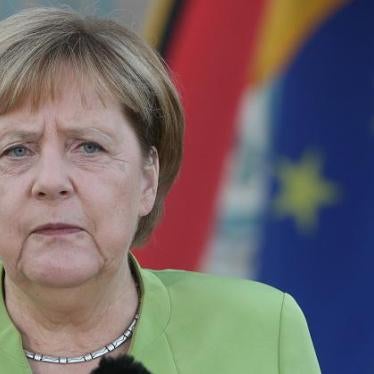When President Donald Trump visited Poland a year ago, he spoke in front of the Warsaw Uprising Monument, a reminder of the suffering of thousands of Polish people under the yoke of tyranny. That day, President Trump praised the Polish government for defending shared values – but failed to acknowledge or mention the country’s ongoing crisis over the rule of law and democracy.
The esplanade where President Trump was welcomed in 2017 has become the rallying place for thousands of people protesting the government’s efforts to dismantle the country’s court system.
This in a country that had some of the best preconditions to transition into a democracy based on rule of law and respect for human rights after the fall of the Soviet Union. This process toward building a full-fledged democracy came to a halt in 2015 when the Law and Justice party came into power. With President Andrzej Duda scheduled for a White House meeting on September 18, it’s time to revisit what has gone wrong in Poland.
Since coming to power in 2015, the Law and Justice party has systematically undermined checks and balances and independent institutions central to democracy. Parliament has adopted laws obstructing the work of the Constitutional Tribunal, one of the country’s two top courts, and enabling political interference in appointing and dismissing judges at the other, the Supreme Court. The authorities have also curbed media freedom, limited freedom of assembly, and sought to restrict the work and muzzle the voices of nongovernmental groups.
The government oversaw a purge of many top judges, and the new judges are effectively political appointments. Thousands of Poles have repeatedly gathered to support of the Supreme Court’s President, Malgorzata Gersdorf, whose firing is widely considered unconstitutional by those outside the government.
The European Commission, the European Parliament and expert bodies at the Council of Europe, and the Organization for Security and Cooperation in Europe have all repeatedly criticized the Polish government’s attacks on democratic institutions.
But Warsaw has ignored and dismissed most of these bodies’ criticisms and largely failed to follow any of their recommendations. The situation is so serious that the European Commission in December 2017 for the first time triggered a procedure provided for in Article 7 of the European Union (EU) treaty – which allows political sanctions to be imposed on an EU government that puts the union’s democratic values at risk.
This July, the EU Court of Justice ruled that concerns over judicial independence in Poland mean that courts in other EU countries can refuse Polish extradition requests – a reminder that a lack of independent courts undermines basic judicial cooperation in Europe. Still the Polish government openly defies making any changes to its problematic laws or taking steps to demonstrate the country in fact respects the core EU value of rule of law.
This is not only detrimental for the people of Poland. With authoritarian tendencies sweeping across some EU member countries, it is clear that mere EU membership is no guarantee for compliance with democratic values. And that is bad news for the US, which has counted on stronger democracy in Poland and other Central Europe countries to secure greater stability in the region.
Polish policy makers value the country’s long partnership with Washington and care about what the US has to say. The US for its part has a long history of promoting and safeguarding human rights and freedom in Europe, and in keeping these issues at the forefront of its foreign policy and relations in the region.
It would be reassuring to think that President Duda might hear about the importance of the international rules-based order, the value of the rule of law, and need for legitimate democratic institutions when he visits the Oval Office later this month. But in meeting with President Trump, Duda is unlikely hear any of this. Instead it is likely that he will be showered with praise and receive assurances on the strength of the US-Polish alliance despite Poland’s increasingly authoritarian and nationalistic agenda. One can see President Trump supporting elements of such an agenda in the US as well.
So it falls to members of Congress, many of whom support centralizing human rights and the rule of law in US foreign policy, to step up and call out the Polish president on his government’s troubling anti-democratic moves. This is appropriate to their role as advocates of a robust bilateral relationship built on shared democratic values and would reinforce their longstanding commitment to ensure the promotion of basic rights, even when the executive branch doesn’t.
Given the absence of a consistent White House voice, if Congress does not send this message, the already weakened US voice in Europe could be further damaged and other leaders emboldened to take their governments down an anti-democratic, authoritarian path.










